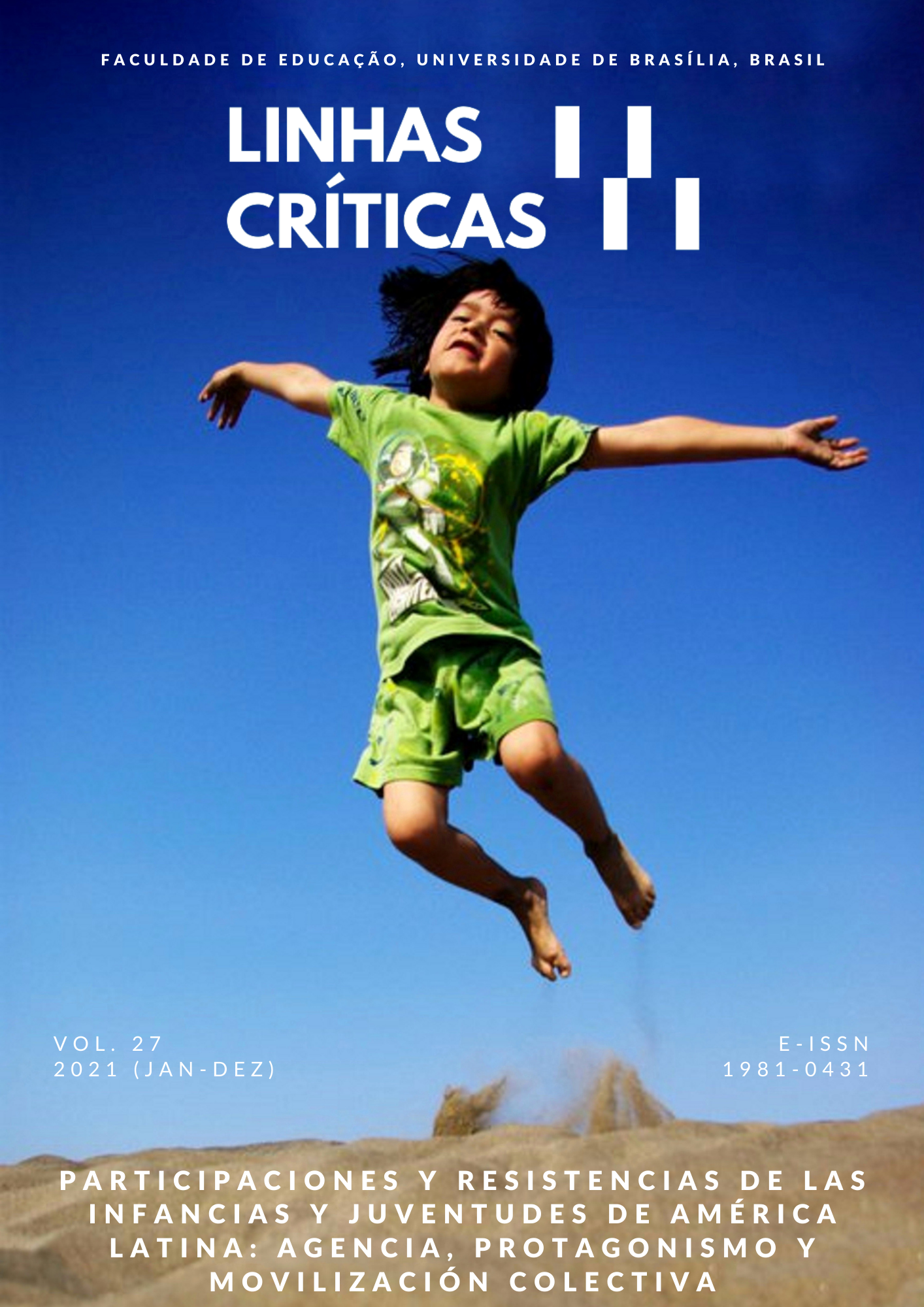Inservice teacher education in pandemic times
the case of the MAIA Project
DOI:
https://doi.org/10.26512/lc27202139025Keywords:
Assessment, Inservice teacher education, Assessment practices, Educational innovation, Covid-19Abstract
The Monitoring, Following-up, and Research in Pedagogical Assessment Project (MAIA Project) is an inservice teacher education project that began in September 2019, aiming at improving assessment and teaching practices as well as student learning. After about five months, in the middle of the pandemic, it was possible to continue the project. Despite the pandemic and the difficulties it created, results have shown that the project dimensions, the theoretical and conceptual framework and the training processes and dynamics used seem to have been decisive to achieve its purposes and its recognized and proven success.
Downloads
References
Baird, J-A., Andrich, D., Hopfenbeck, T., & Stobart, G. (2017) Assessment and learning: fields apart? Assessment in Education: Principles, Policy & Practice, 24(3), 317-350. https://doi.org/10.1080/0969594X.2017.1319337
Barbosa, P., Ursi, S., & Mattos, C. (2011). Teoria da atividade e a formação de professores na educação a distância. ESUD 2011 – VIII Congresso Brasileiro de Ensino Superior a Distância. Ouro Preto, Minas Gerais, Brasil. http://botanicaonline.com.br/geral/arquivos/Barbosa%20Ursi%20Mattos%202011%20ESUD.pdf
Black, P., & Wiliam, D. (2018). Classroom assessment and pedagogy. Assessment in Education: Principles, Policy & Practice, 25(6), 551-575. https://doi.org/10.1080/0969594X.2018.1441807
Brown, A. L. (2014). Implementing active learning into online teacher preparation courses. The American Journal of Distance Education, 28(3), 170-182. https://doi.org/10.1080/08923647.2014.924695
Eisner, E. (2005). Reimagining schools: the selected works of Elliot W. Eisner. Routledge.
Engeström, Y. (1999). Activity theory and individual and social transformation. Em Y. Engeström, R. Miettinen, & R-L. Punamaki. Perspectives on activity theory (19-38). Cambridge University Press.
Fernandes, D. (2009). Avaliação das aprendizagens em Portugal: investigação e teoria da atividade. Sísifo: Revista de Ciências da Educação, 9, 87-100. https://repositorio.ul.pt/handle/10451/5540
Fernandes, D. (2019). Para um enquadramento teórico da avaliação formativa e da avaliação sumativa das aprendizagens escolares. Em M. I. R. Ortigão, D. Fernandes, T. V. Pereira, & L. Santos. Avaliar para aprender em Portugal e no Brasil: perspectivas teóricas, práticas e de desenvolvimento (139-164). CRV.
Fernandes, D. (2021a). Para um enquadramento da formação de professores. Texto de apoio à formação - Projeto de Monitorização, Acompanhamento e Investigação em Avaliação Pedagógica (MAIA). Ministério da Educação/Direção-Geral da Educação. https://afc.dge.mec.pt/sites/default/files/2021-05/TextoApoio%204_Para%20um%20Enquadramento%20da%20Forma%C3%A7%C3%A3o%20de%20Professores.pdf
Fernandes, D. (2021b). Para a conceção e elaboração do projeto de intervenção no âmbito do Projeto MAIA. Texto de apoio à formação - Projeto de Monitorização, Acompanhamento e Investigação em Avaliação Pedagógica (MAIA). Ministério da Educação/Direção-Geral da Educação. https://afc.dge.mec.pt/sites/default/files/2021-05/TextoApoio3_%20Para%20a%20Conce%C3%A7%C3%A3o%20e%20Elabora%C3%A7%C3%A3o%20do%20Projeto%20de%20Interven%C3%A7%C3%A3o%20no%20%C3%82mbito%20do%20Projeto%20MAIA.pdf
Fernandes, D. (2021c). Avaliação pedagógica, classificação e notas: perspetivas contemporâneas. Folha de apoio à formação - Projeto de Monitorização, Acompanhamento e Investigação em Avaliação Pedagógica (MAIA). Ministério da Educação/Direção-Geral da Educação. https://afc.dge.mec.pt/sites/default/files/2021-05/Folha10_Avalia%C3%A7%C3%A3o%20Pedag%C3%B3gica%2C%20Classifica%C3%A7%C3%A3o%20e%20Notas_Perspetivas%20Contepor%C3%A2neas.pdf
Fernandes, D., Machado, E., & Candeias, F. (2020). Para uma avaliação pedagógica: dinâmicas e processos de formação no Projeto MAIA (2019-2020). Ministério da Educação/Direção-Geral da Educação. https://afc.dge.mec.pt/sites/default/files/2021-03/relatorio_projeto_maia_0.pdf
Harlen, W. (2012). On the relationship between assessment for formative and summative purposes. Em J. Gardner. Assessment and learning (87-102). Sage. http://doi.org/10.4135/9781446250808.n6
Lave, J., & Wenger, E. (1991). Situated learning: Legitimate peripheral participation. Cambridge University Press.
Martins, G., Gomes, C., Brocardo, J., Pedroso, J., Carrillo, J., Silva, L., Encarnação, M., Horta, M., Calçada, T., Nery, R., & Rodrigues, S. (2017). Perfil dos alunos à saída da escolaridade obrigatória. Ministério da Educação. Direção-Geral de Educação. https://dge.mec.pt/sites/default/files/Curriculo/Projeto_Autonomia_e_Flexibilidade/perfil_dos_alunos.pdf
Niemi, H. (2002). Active learning: a cultural change needed in teacher education and schools. Teaching and Teacher Education, 18(7), 763-780. http://doi.org/10.1016/S0742-051X(02)00042-2
Portugal. (2015). Decreto-Lei n.º 127/2015, 7 de julho (Aprova as regras a que obedece a constituição e o funcionamento dos Centros de Formação de Associação de Escolas). Ministério da Educação e Ciência. https://dre.pt/home/-/dre/69736208/details/maximized
Portugal. (2017). Despacho n.º 6478/2017, 26 de julho (Homologa o perfil dos alunos à saída da escolaridade obrigatória). Gabinete do Secretário de Estado da Educação. https://dre.pt/home/-/dre/107752620/details/2/maximized
Portugal. (2018a). Decreto-Lei n.º 54/2018, de 6 de julho (Estabelece o regime jurídico da educação inclusiva). Presidência do Conselho de Ministros. https://dre.pt/home/-/dre/115652961/details/maximized
Portugal. (2018b). Decreto-Lei n.º 55/2018, de 6 de julho (Estabelece o currículo dos ensinos básico e secundário e os princípios orientadores da avaliação das aprendizagens). Presidência do Conselho de Ministros. https://dre.pt/home/-/dre/115652962/details/maximized
Resnick, L. (1987). Education and learning to think. National Academies Press. https://www.nap.edu/read/1032/chapter/1
Rodrigues, A. (2019). Aprendizagem ativa: como inovar na sala de aula. Lisbon International Press.
Schön, D. (1991). The reflective practitioner: how professionals think in action. Routledge.
Silva, K. (2015). A perspectiva do professor pesquisador/reflexivo e a figura do Barão de Münchhausen. Linhas Críticas, 21(46), 565-583. https://doi.org/10.26512/lc.v21i46.4641
Wenger, E. (1998). Communities of practice: Learning, meaning, and identity. Cambridge University Press.
Wiliam, D. (2017). Learning and assessment: a long and winding road? Assessment in Education: Principles, Policy & Practice, 24(3), 309-316. https://doi.org/10.1080/0969594X.2017.1338520
Wiliam, D., Brookhart, S. M., Guskey, T. R., & McTighe, J. (2020). Grading in a comprehensive and
balanced assessment system. Learning Sciences International Dylan Wiliam Center.
https://www.dylanwiliamcenter.com/whitepapers/grading-policy-paper/
Wolcott, H. (1994). Transforming qualitative data: description, analysis, and interpretation. Sage.
Young, M. (2008). Bringing knowledge back in: from social constructivism to social realism in the sociology of education. Routledge.
Published
How to Cite
Issue
Section
License
Copyright (c) 2021 Domingos Fernandes

This work is licensed under a Creative Commons Attribution 4.0 International License.
Authors who publish in this journal agree to the following terms:
-Authors maintains the copyright and grants the journal the right of first publication, the work being simultaneously licensed under the Creative Commons Attribution License which allows the sharing of the work with recognition of the authorship of the work and initial publication in this journal.
- Authors are authorized to enter into additional contracts separately, for non-exclusive distribution of the version of the work published in this journal (eg publish in institutional repository or as a book chapter), with acknowledgment of authorship and initial publication in this journal.
-Authorers are allowed and encouraged to publish and distribute their work online (eg in institutional repositories or on their personal page) at any point before or during the editorial process, as this can generate productive changes as well as increase the impact and the citation of published work (See The Effect of Free Access).



